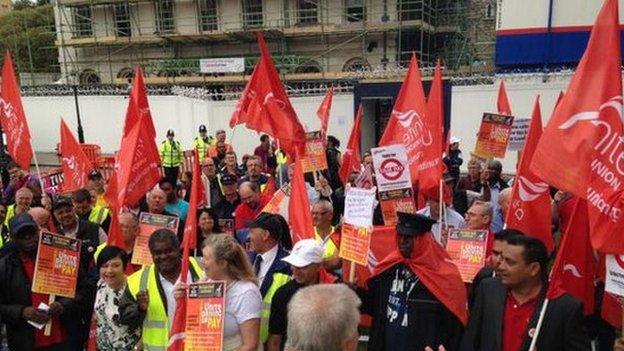London bus drivers in 24-hour strike
- Published
Transport for London said about a third of its 7,500 buses were running
Bus drivers in London are taking part in a 24-hour strike as part of a campaign for a single agreement covering pay and conditions.
Members of the Unite union at 18 bus companies walked out at 00:01 GMT. About 630 out of 670 routes were affected by the industrial action.
Unite said with no collective pay deal there were 80 different pay rates for drivers doing the same job.
But TfL said the action was "extremely disappointing".
'Last resort'
Services were affected from about 04:00 with TfL, adding buses operating on Tuesday night into Wednesday would also be disrupted.
The strike has left regular bus commuters looking for different ways of travelling around London. On Twitter Lloyd tweeted, external: "It was a war zone outside Victoria tube station."
But Jake, a bus driver of one year, said he had gone on strike because he felt his wage was not good enough to support his life in London.
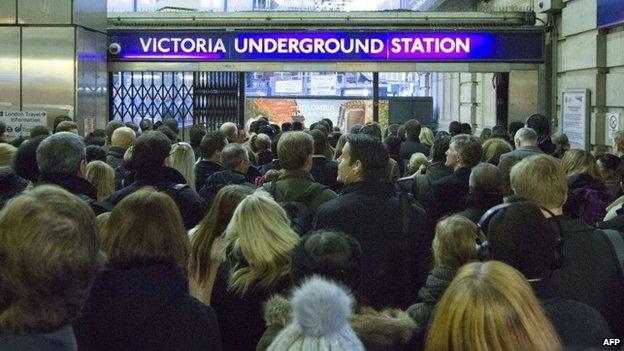
Commuters were forced to queue at Tube stations as they looked for alternatives to bus journeys
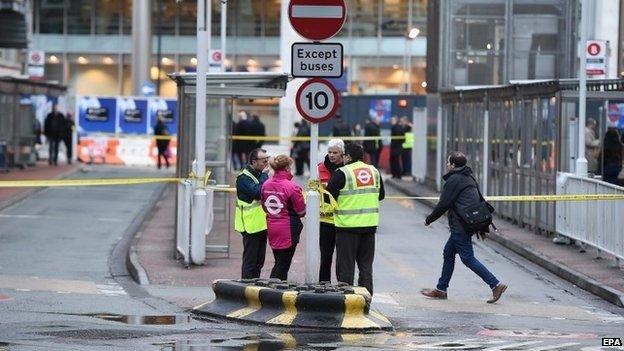
Transport for London said about a third of its 7,500 buses were running
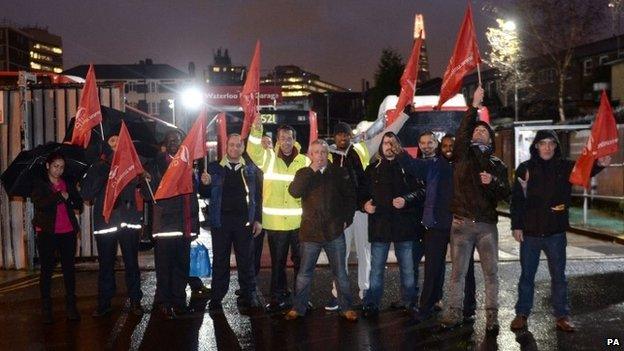
London Bus workers hold a strike outside Waterloo Bus Garage in London
He said: "My rate of pay is £9.30 an hour. I just want something that's a bit better.
"It depends on the shifts I get per week [whether] I can take home £300 and rent in north London is like £1,000 a month."
Unite said wages were negotiated on a company-by-company basis, meaning hourly rates could vary by more than £3.
Wayne King, London regional officer for Unite, said: "Strike action is the last resort. We've been forced into this position by the operators' refusal to even meet with us.
"Passengers sitting side-by-side on the same route expect to pay the same fare, so why shouldn't drivers expect to be paid the same rate?
"The bus operators need to stop pleading poverty in defending pay inequality and collectively start negotiating about a fairer deal for London's bus workers."
Peter Kavanagh, the union's regional secretary, said it was possible that further strikes could be held.
"If there's no movement from the employers, the spirit and the determination from our members on the picket lines is very clear - if they won't agree to talks, we'll be out again," he told BBC London News.
London Mayor Boris Johnson, who does not have the same power over the bus network as the London Underground, defended the differential pay rates.
He told BBC Radio 4's Today programme: "It is very, very sensible to have different pay rates across London. There are different working environments, different labour markets across the city."
He added the strike had a "very, very small turnout in the key vote".
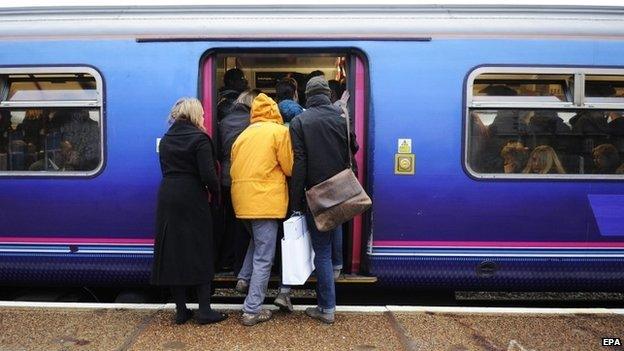
Services were affected from 04:00 GMT and many travellers had to find alternative modes of transport
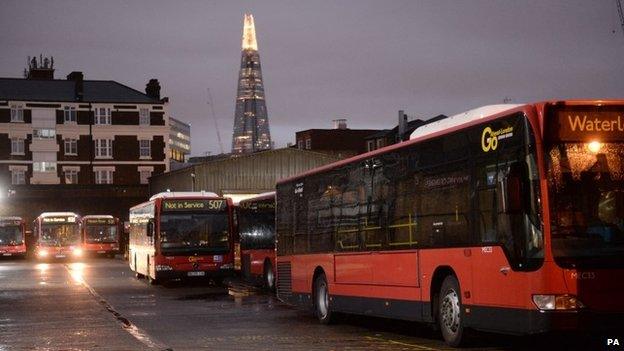
Many of the city's buses are sporting "Not in service" destination boards
TfL said less than 16% of the bus drivers in London voted in favour of industrial action.
But Unite retaliated by saying about 20,000 of its members had joined the strike, with picket lines at 70 bus depots and the mayor should "look at the streets of London today and recognise the depth of anger felt by bus workers".
Mike Weston, TfL's Director of Buses, said apologised for the disruption and added: "As in all professions, bus drivers have different skills and experience and it is only right that this can be reflected in pay.
"If all drivers are paid the average then by definition half of all bus drivers will need to take a pay cut. Any 'levelling up' of pay to the highest rates would lead to a cut in bus services, an increase in fares, or both."
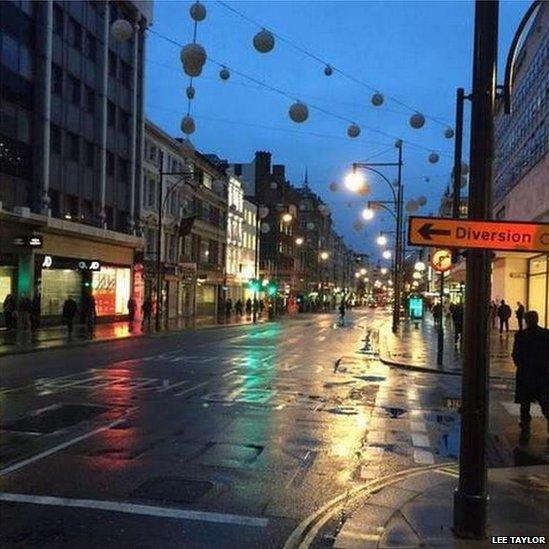
Oxford Street was looking much emptier than usual without a steady stream of buses
Val Shawcross, Labour's transport spokeswoman on the London Assembly, said the dispute was "not surprising given the fact that London's bus operating companies treat drivers so unfairly".
She said it was only the second London-wide bus strike in 50 years.
The assembly's Conservative transport spokesman Richard Tracey said the action was "archaic and belongs in the past".
Travellers have been urged to check the TfL website, external for the latest updates.
The organisation said bus tickets would be accepted on the Underground, DLR, London Overground and London Tramlink and the "average bus journey is around 2.2 miles so some journeys could be completed by walking or cycling".
Marshalled taxi ranks will be operating from some train stations.
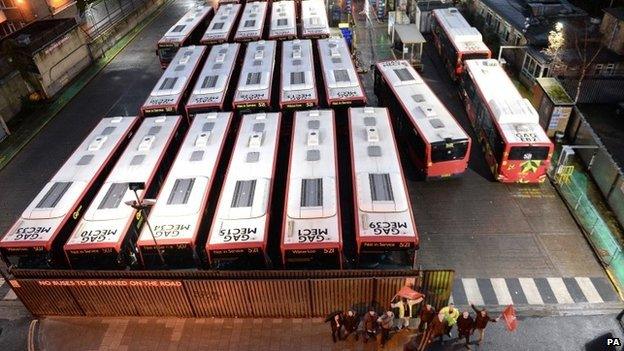
Unite said there were picket lines at 70 bus depots, including Waterloo bus garage
A spokesperson for Metroline, one of the bus companies involved, said: "Unite is seeking to move to a common rate of pay across all bus companies in London and we have challenged this on the grounds that it would be illegal for us to agree to their demand."
Bus operator Go-Ahead said 839 of its drivers out of an eligible workforce of 6,076 voted for strike action.
Managing director John Trayner said it was "a dispute we cannot resolve".
The bus companies involved in the dispute are: Arriva North, Arriva South, Selkent, London General, Metroline, Metroline West, Metrobus, CT Plus, London United, Abellio West London, London Sovereign, Stagecoach, Blue Triangle, Northumberland Park, Tower Transit, Docklands and London Central.
- Published7 January 2015
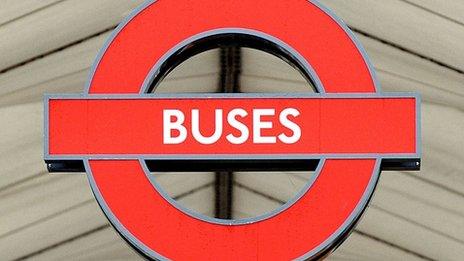
- Published4 November 2014

- Published11 September 2014
